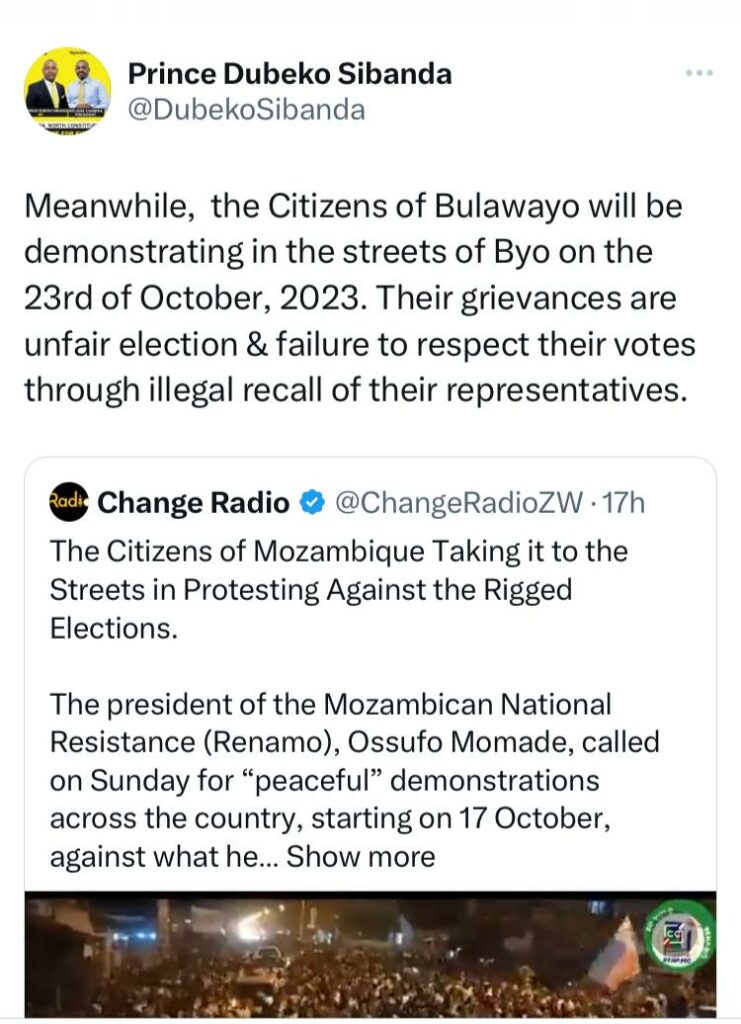The Citizens Coalition for Change (CCC), is planning to hold a demonstration in Bulawayo to protest the recent ‘controversial’ recall of 24 of its members who were removed from Parliament, as well as the disputed August election.
The protest has been scheduled for next Monday, October 23, 2023.
CCC’s Binga North MP, Prince Dubeko Sibanda, confirmed the plan to CITE.
“It’s true. It’s official, police have received our communication,” he said briefly when the publication sought a comment from him.
This was after Sibanda wrote about the planned demonstration on his X account on Monday.
“Meanwhile, the Citizens of Bulawayo will be demonstrating in the streets of Bulawayo on the 23rd of October, 2023. Their grievances are unfair election and failure to respect their votes through illegal recall of their representatives,” said the MP on X.

Last week, CCC wrote a letter to the Speaker of the National Assembly in Parliament, Jacob Mudenda, asking him to reverse the recalls of its members.
15 of the recalled lawmakers are National Assembly members while nine are Senators.
After the recalls, CCC leader, Nelson Chamisa announced that its elected members would disengage from Parliament and Council business until the legitimacy issues surrounding the election are resolved.
The MPs were recalled under the instruction of one Sengezo Tshabangu who claimed to the CCC interim Secretary-General on October 3 to the Speaker, who allegedly ignored a letter from Chamisa outlining who had the rightful power to effect recalls.
The opposition party still maintains that the August 23 election was rigged while the lead-up to the polls was riddled with other irregularities that put the opposition at a disadvantage.
In its final report, the Southern African Development Community (SADC) Election Observer Mission concluded that the polls fell short of accepted regional and international standards.
The report highlighted issues to do with Zimbabwe’s legal framework, the Zimbabwe Electoral Commission’s (ZEC) independence, postal voting by state security agencies, the media, and the diaspora vote.
SADC also raised concerns about the involvement of the shadowy organisation Forever Associates Zimbabwe (FAZ), the judiciary, and the police’s inconsistent application of laws.
“The SEOM noted that … some aspects of the Harmonised Elections fell short of the requirements of the Constitution of Zimbabwe, the Electoral Act, and the SADC Principles and Guidelines Governing Democratic Elections (2021),” reads the report that was signed by SADC Chairperson of the Organ on Politics, Zambian President Hakainde Hichilema.
SEOM also noted the delimitation exercise that was conducted in 2022 by ZEC was marred with controversy. It also found that the average number of voters per constituency is inconsistent with the provision of section 161(6) of the new Constitution adopted in 2013.
In its recommendations, the SADC mission urged ZEC to avail the voters’ roll to stakeholders to allow enough time for inspection and verification in line with the Electoral Act.

